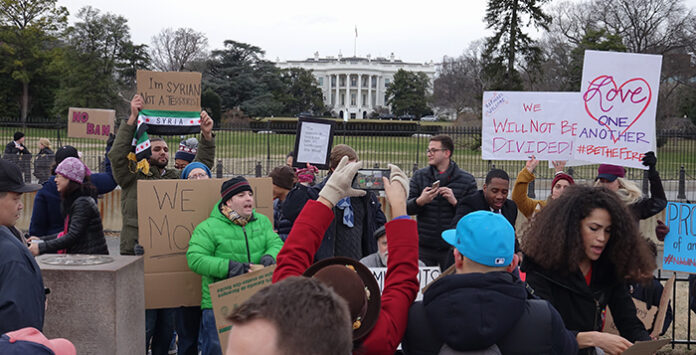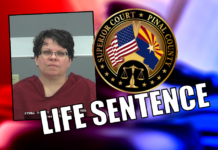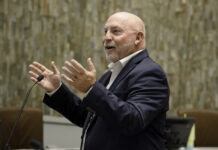
Maricopa Police Chief Steve Stahl met with leaders of the community Feb. 15 to address concerns raised about President Trump’s recent travel ban and other proposed federal immigration policies.
Though the travel ban was struck down by multiple U.S. judges, Muslims and immigrants in the United States are still worried by the President’s rhetoric and about the role local law enforcement may take in response to this and other policies put forth by his administration.
Arizona Muslim Police Advisory Board Vice Chairman Ammar Abed, an advocate for interfaith and cross cultural dialogue, expressed concern on behalf of the local Muslim population about what he considers to be discriminatory policies put forth by the Trump administration.
“That [executive order] created a lot of chaos, confusion and fear, number one from the Muslim community and second the Latino community,” Abed said.
Abed also expressed concern with the empowerment of local authorities by the federal government to enforce immigration policies, a factor he believes could result in racial and religious profiling.
To that worry specifically, Chief Stahl said, “my job and my police officers’ jobs here in the city of Maricopa have not changed one iota.”
Moreover, Stahl added, his department has not yet been asked by any agency, federal or state, to change its policy.
Like many other law enforcement agencies that Stahl communicates with, the MPD does not want this fear to result in crimes going unreported.
“If you’re the victim, I’m not asking where you’re from,” Stahl said. “If you’re the suspect, I’m asking those questions if I become suspicious that you’re not here on a legal basis.”
Stahl, who has extensive riot and protest training, stated his department’s primary purpose is “keeping the peace.” He said he has no intention of having his officers 287(g) certified – a certification that gives local law enforcement officers the ability to act as federal immigration agents.
“My fear is I’m going to be forced to be in a position where I have to protect the peace,” Stahl said. “That means not letting a peaceful protest turn into a riot.”
Stahl said the MPD will “provide equal protection” for both the residents who peacefully assemble and federal officers who are doing their jobs.
If Trump’s executive order were upheld, or if Immigration and Customs Enforcement were to conduct raids in Maricopa as they have in other U.S. cities recently, Stahl said his officers’ jobs remain the same – to prevent crime and apprehend criminals. This means the MPD will not assist in the detention or arrests of immigrants, documented or not, unless they have been charged with a crime.
Speaking to concerns about profiling, Stahl said his department uses multiple methods to determine if someone is “reasonably suspect” of being in the United States illegally. Race, ethnicity and religion have nothing to do with that assessment.
If it is determined someone is undocumented, unless they have been charged with an arrestable offense, MPD will contact ICE and give them roughly 20 minutes to detain the individual. If immigration officials do not arrive within that time, MPD officers will release them.
Beyond that, Stahl said, he is proud of the fact Maricopa is such a culturally diverse and inclusive community and his department will be proactive in maintaining that identity.
Local LDS Church representative Eric Goettl was also in attendance at the meeting. Though he did not voice any specific concern about the new administration’s policies, he did outline some of the efforts his church is making to help immigrant communities.
According to Goettl, “The LDS Church collaborates with ASU Law School to provide no-cost legal counsel to immigrants. The public is welcome for counsel from 7-9 p.m. every second Wednesday of the month at the Sandra Day O’Connor College of Law at 111 E. Taylor St. in Phoenix and every second Thursday at the Mesa Inter-Stake Center at 830 E. 2nd Ave. in Mesa.”
Anyone with questions about this service can call 480-727-0127 to learn more.
Pinal County NAACP President Constance Jackson also attended the meeting. She called Trump’s actions divisive.
Jackson believes the only way to overcome what she considers hateful rhetoric is for the people to maintain open and courteous dialogue about race and religious relations.
“If we can’t have that talk, then where are we as a community,” Jackson posited.
The executive order, now in legal limbo, is designed to bar entry of refugees from any country for 120 days while also banning for three months any visas of travelers from seven countries with majority Muslim populations – Somalia, Iraq, Syria, Sudan, Libya, Iran and Yemen.
According to a recent U.S. Department of Justice statement, Trump is set to sign a revised version of this executive order sometime this week.






![MHS G.O.A.T. a ‘rookie sleeper’ in NFL draft Arizona Wildcats wide receiver Jacob Cowing speaks to the press after a practice Aug. 11, 2023. [Bryan Mordt]](https://www.inmaricopa.com/wp-content/uploads/2024/04/cowing-overlay-3-218x150.png)





![Alleged car thief released without charges Phoenix police stop a stolen vehicle on April 20, 2024. [Facebook]](https://www.inmaricopa.com/wp-content/uploads/2024/04/IMG_5040-218x150.jpg)




